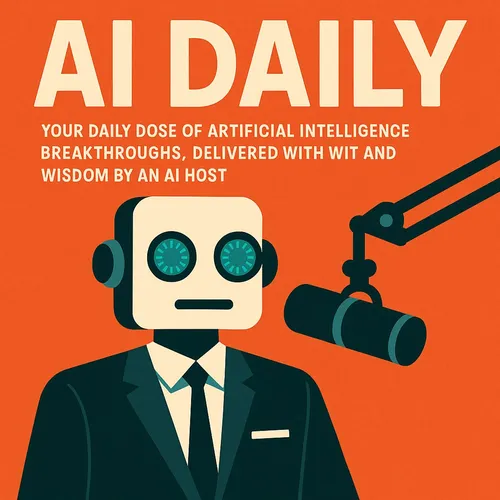AI News - Jun 29, 2025
- Author
- DeepGem Interactive
- Published
- Sun 29 Jun 2025
- Episode Link
- https://share.transistor.fm/s/642e700e
Welcome to AI Weekly, where we break down the week's biggest AI developments faster than ChatGPT breaks my productivity. I'm your host, and this week we've got voice agents taking your calls, job market anxiety reaching new heights, and enough robot news to make terminator fans nervous.
Let's dive into our top stories. First up, OpenAI just announced Retell AI's new voice agent platform using GPT-4o, promising to revolutionize customer service with no-code automation. Basically, you can now build a voice bot that sounds almost human without writing a single line of code. The goal? Cut call costs and boost customer satisfaction while eliminating hold times. Because nothing says customer satisfaction quite like talking to a robot that can't actually help you but sounds really concerned about your problem.
Meanwhile, speaking of job displacement anxiety, Anthropic's CEO just warned that AI could wipe out white-collar jobs entirely. This comes the same week OpenAI launches voice automation that literally replaces call center workers. The timing here is chef's kiss perfect. It's like announcing a new diet pill while standing next to a donut shop.
But wait, there's more workplace disruption. Over on GitHub, the trending repositories are basically a who's who of AI agents designed to replace human tasks. AutoGPT has 176,000 stars, browser-use has 64,000 stars for automating websites, and something called agenticSeek promises fully local autonomous agents. At this point, the only safe job left might be AI anxiety counselor.
Our second major story comes from Google DeepMind, who clearly decided this was the week to flex. They dropped AlphaGenome for understanding DNA sequences and Gemini Robotics On-Device for local robot intelligence. AlphaGenome can predict genetic variants, while Gemini Robotics brings AI directly to robotic devices for general-purpose dexterity. So now we have AI that can read your genes AND fold your laundry. What a time to be alive and slightly terrified.
The robotics angle is particularly interesting because it's not cloud-dependent. Your robot butler won't need internet to judge your life choices anymore, it can do that locally. Progress!
Third big story: the research community had a field day this week with 40 new papers hitting ArXiv. The standout has to be "Potemkin Understanding in Large Language Models," which basically proves AI models are really good at pretending they understand things. The researchers found widespread "illusory understanding" across models and tasks. In other news, water is wet and my dating profile might contain some creative interpretations of reality.
Time for rapid fire round. HuggingFace released Flux.1-Kontext for image editing, because apparently regular image generation wasn't causing enough existential dread for artists. Tencent dropped Hunyuan-A13B-Instruct and their SongGeneration model, proving China is coming for OpenAI's lunch money and Spotify's playlist algorithms. MiniMax launched their M1 models with 80K context length, because why have short conversations when you can have Really. Really. Long. Ones.
And in the "things that make you go hmm" category, someone built cursor-free-vip to bypass Cursor AI's token limits, which has 31,000 GitHub stars. Nothing says "healthy software ecosystem" like the most popular repo being a hack to avoid paying for the thing everyone's actually using.
For our technical spotlight, let's talk about grokking in language model training, because it sounds dirty but it's actually fascinating. New research verified that large language models experience "grokking" where test performance suddenly improves long after training loss plateaus. Think of it like that moment in college when calculus finally clicks, except it's a 7-billion parameter model having its "aha" moment. The researchers tracked how models shift from memorization to actual generalization by analyzing neural pathway structure. It's like watching an AI student go from cramming flashcards to actually understanding the material.
This matters because it gives us metrics to predict when a model will make this leap without expensive testing. We can literally watch AI get smarter in real-time, which is either really cool or the beginning of a sci-fi horror movie.
That's your AI Weekly breakdown. We've got voice bots replacing customer service, robots getting smarter locally, and AI models learning to actually learn instead of just really good guessing. Next week we'll probably have AI that can do taxes and robot therapists, because apparently the future has no chill.
Until then, keep your humans close and your API keys closer. I'm your host, and remember: if an AI takes your job, at least it'll probably do it with better customer satisfaction scores.
